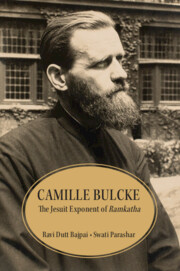Book contents
- Frontmatter
- Dedication
- Epigraphy
- Contents
- List of Figures
- Foreword
- Acknowledgements
- 1 Camille Bulcke: A New Horizon of Indology
- 2 From Belgium to India: Inner and Outer Journeys
- 3 A Scholar-Priest in the Making
- 4 From Christ Bhakti to Tulsidas’ Rama Bhakti
- 5 Contributions to Indology and Scholarly Legacy
- 6 The Man and His Mission: A Critical Appraisal
- Glossary
- Bibliography
- Index
3 - A Scholar-Priest in the Making
Published online by Cambridge University Press: 28 November 2024
- Frontmatter
- Dedication
- Epigraphy
- Contents
- List of Figures
- Foreword
- Acknowledgements
- 1 Camille Bulcke: A New Horizon of Indology
- 2 From Belgium to India: Inner and Outer Journeys
- 3 A Scholar-Priest in the Making
- 4 From Christ Bhakti to Tulsidas’ Rama Bhakti
- 5 Contributions to Indology and Scholarly Legacy
- 6 The Man and His Mission: A Critical Appraisal
- Glossary
- Bibliography
- Index
Summary
The Linguaphile Activist
The celebrated Hindi poet Mahadevi Verma claimed that a monk does not need to be a scholar or an author. However, should the three qualities of spiritual practice, scholarship and literary craft blend, such a synthesis is sublime and sacred (M. Verma 1987, p. 32). For Verma, Camille, her dear younger brother, embodied this rare confluence. This chapter explores his progression from a young engineering student into Father Bulcke, the worldrenowned scholar on the Ramkatha, Hindi literature and Indology. Rama's story in the Ramcharitmanas, written by the celebrated Indian poet from the Bhakti era, Tulsidas, is considered a literary masterpiece and one of the most popular versions of the Ramayana in India. Tulsidas believed that the narration of Rama's story (in Awadhi, a north Indian vernacular language), undertaken purely for his own personal happiness, would ultimately bring him moksha, the highest spiritual goal in the teachings of Hinduism. Camille always referred to Tulsidas as his idol; propitiously, one may argue that by working on the genesis and the development of the Rama story, much like what Tulsidas wished for himself, Camille also strove for his intellectual moksha.
He was proud of his linguistic heritage; he loved his native Flemish language, while the society around him considered embracing French as the mark of upward mobility. His deep emotional bond with his mother tongue inspired him to become one of the leading activists in the political movement to adopt Flemish as a medium of academic, institutional and official language. As a protagonist of the Flemish language, he was greatly inspired by the Flemish writer Guido Gezelle; in fact, Gezelle was one of the first serious intellectual and theological influences on Camille's life. As a linguaphile, Camille was not against the French language per se; his opposition was directed against the imposition of a language as part of a colonial project to erase the local language and culture. His early brush with the French cultural and linguistic hegemony and his belief that language is the custodian of the cultural essence of any society eventually shaped the future course of his life, and his scholarship and activism in India.
- Type
- Chapter
- Information
- Camille BulckeThe Jesuit Devotee of Tulsidas, pp. 50 - 103Publisher: Cambridge University PressPrint publication year: 2024

